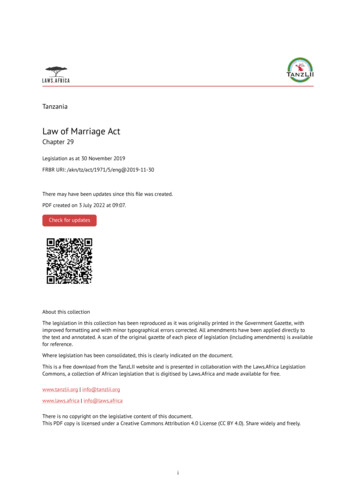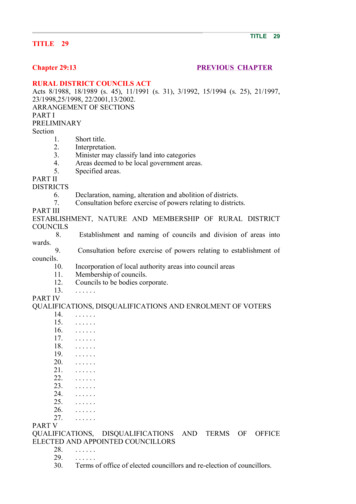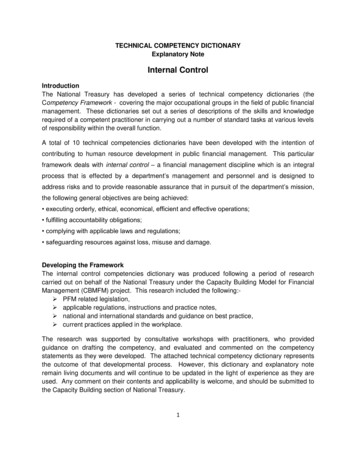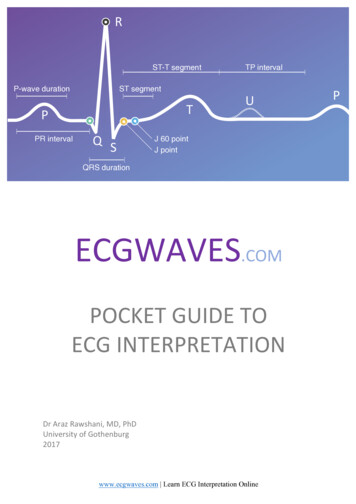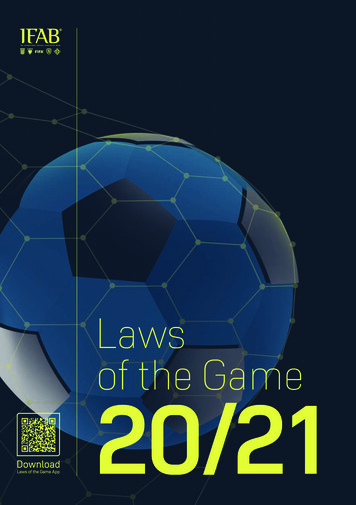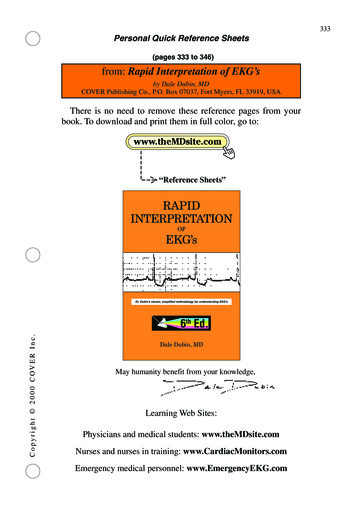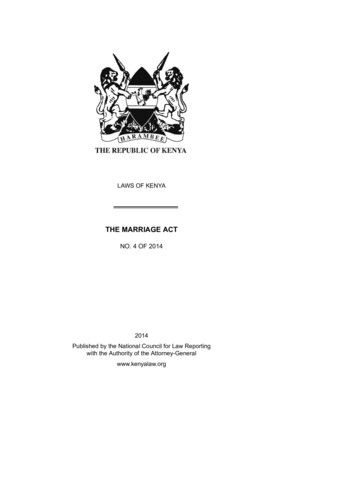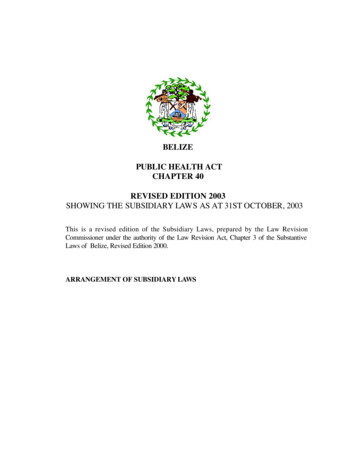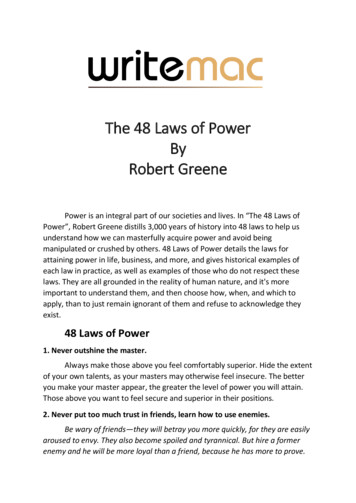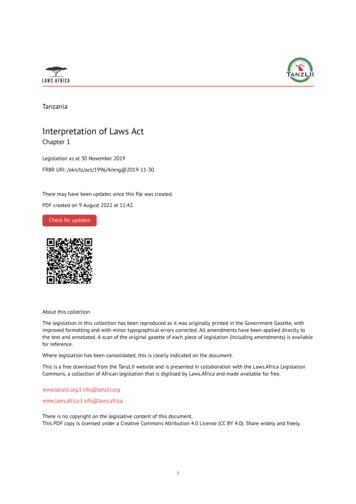
Transcription
TanzaniaInterpretation of Laws ActChapter 1Legislation as at 30 November 2019FRBR URI: /akn/tz/act/1996/4/eng@2019-11-30There may have been updates since this file was created.PDF created on 9 August 2022 at 11:42.Check for updatesAbout this collectionThe legislation in this collection has been reproduced as it was originally printed in the Government Gazette, withimproved formatting and with minor typographical errors corrected. All amendments have been applied directly tothe text and annotated. A scan of the original gazette of each piece of legislation (including amendments) is availablefor reference.Where legislation has been consolidated, this is clearly indicated on the document.This is a free download from the TanzLII website and is presented in collaboration with the Laws.Africa LegislationCommons, a collection of African legislation that is digitised by Laws.Africa and made available for free.www.tanzlii.org info@tanzlii.orgwww.laws.africa info@laws.africaThere is no copyright on the legislative content of this document.This PDF copy is licensed under a Creative Commons Attribution 4.0 License (CC BY 4.0). Share widely and freely.i
Interpretation of Laws ActContentsPart I – Preliminary provisions . 11. Short title . 12. Application . 13. Act to bind the Republic . 1Part II – General provisions of interpretation . 24. Definitions applicable to written laws . 25. Application of definitions . 86. Laws always speaking . 87. Parts of speech and grammatical forms . 88. Gender and number . 89. Reference in written law to the Minister . 810. References by number to be inclusive . 911. Construction of internal references to section, etc. . 912. Reference to written law as amended . 913. Disjunctive construction of "or" . 9Part III – Commencement and citation of laws . 914. Date of commencement of Act . 915. Time of commencement of written laws . 1016. Effective date of commencement provisions where notice of commencement required . 1017. Construction of power to fix date of commencement . 1018. Evidence of date of assent . 1019. Exercise of powers before commencement . 1020. Citation of written laws . 1121. References in written law to day of commencement . 11Part IV – Provisions as to enactment and operation of written law . 1222. Acts to be public Acts . 1223. Section to be substantive enactment . 1224. Act may be altered or repealed in same session . 1225. Preambles and Schedules . 1226. Headings, marginal notes, footnotes and rectification of errors . 12Part V – Amendment and repeal of written law . 1227. Construction of amending Act with amended Act . 1228. Repeal of written law as amended . 1229. Repeal of repeal . 13ii
30. Repeal and substitution . 1331. Effect of substituting provisions . 1332. General savings on repeal . 1333. Effect of repeal of Act on subsidiary legislation . 1434. Effect of expiry of written law . 14Part VI – Provisions relating to subsidiary legislation . 1435. President may make subsidiary legislation . 1436. General provisions regarding power to make subsidiary legislation . 1437. Publication and commencement of subsidiary legislation . 1538. Laying regulations before National Assembly and disallowance . 1639. Construction of subsidiary legislation . 1740. Citation of subsidiary legislation . 1741. Reference to written law to include subsidiary legislation . 1742. Acts under subsidiary legislation deemed done under Act . 1743. Fees and charges . 17Part VII – Statutory powers and duties . 1844. Time for exercise of power or performance of duty . 1845. Reference to holder of office includes successors . 1846. Construction of enabling words . 1847. Power to issue licence, etc, discretionary . 1848. Power to appoint includes power to suspend, dismiss, etc. . 1949. Appointment by name or officer, etc, and appointment of Chairman, etc, or Board, etc. . 1950. Power of majority quorum etc. . 2051. Exercise of power may be corrected . 2052. Effect of appointment when retiring officer on leave . 2053. "May" imports discretion, "shall" is imperative . 2054. Powers of board, etc, not affected by vacancy or certain defects . 2055. Exercise of certain powers by delegate . 2156. Reference to an area by designation . 2157. Construction of power to delegate . 2158. Who shall affix the common seal of a body corporate . 2259. Rights of Government . 22Part VIII – Provisions regarding time and distance . 2260. Computation of time . 2261. Reckoning of months . 23iii
62. Provisions where no time fixed . 2363. Construction of power to extend time . 2364. Deviations from forms . 2465. Measurement of distance . 24Part IX – Procedures and penalties . 2466. Ex officio proceeding not to abate on death . 2467. Rules of court . 2468. Imposition of penalty not bar to civil action . 2469. Recovery of fines and penalties . 2470. Double jeopardy . 2471. Application of penal laws to bodies corporate . 2472. Provisions as to offences under two or more Acts . 2573. Amendment of penalty . 2574. Prescription of maximum, minimum daily and cumulative penalties . 2575. Provision as to attempts . 2676. Disposal of forfeits . 2677. Liability of employer or principal . 2678. Evidence of fiat, sanction or consent of public officer . 2679. Exercise of DDP’s functions in his absence . 2680. Statement of penalty at end of provision . 2681. Continuing offences . 27Part X – Miscellaneous provisions . 2782. Service of documents by post . 2783. Service of documents generally . 2884. Language of laws of Tanzania . 2885. Repeal . 28Schedule (Section 4) . 29iv
Interpretation of Laws ActTanzaniaTanzaniaInterpretation of Laws ActChapter 1Commenced on 1 September 2004[This is the version of this document at 30 November 2019.]An Act to consolidate the law relating to the construction, application, interpretation and operation ofwritten laws and to provide for related matters.Part I – Preliminary provisions1.Short title(1)This Act may be cited as the Interpretation of Laws Act.(2)[omitted](3)2.3.In this section "the Revised Edition 2002" means the Laws of Tanzania as revised and Published.Application(1)This Act shall apply to Mainland Tanzania as well as to Tanzania Zanzibar in relation to all lawswhich apply throughout the United Republic.(2)The provisions of this Act shall apply to, and in relation to, every written law, and every publicdocument whether the law or public document was enacted, passed, made or issued before or afterthe commencement of this Act, unless in relation to a particular written law or document—(a)express provision to the contrary is made in an Act;(b)in the case of an Act, the intent and object of the Act or something in the subject or contextof the Act is inconsistent with such application; or(c)in the case of subsidiary legislation, the intent and object of the Act under which thatsubsidiary legislation is made is inconsistent with such application.(3)The provisions of this Act shall apply to this Act as they apply to an Act passed after this Actcommences.(4)In sections 13, 15, 19, 20, 22, 23, 24, 33, 36(6), 43, 46, or 62 a reference to any Act, written law,enactment or subsidiary legislation passed or made after the commencement of this Act shall beconstrued so as not to include any enactment which continues or directly amends, but does notrepeal entirely, the text of an existing written law.Act to bind the RepublicThis Act binds the United Republic.By Tanzlii.org and Laws.Africa. Share widely and freely.1
Interpretation of Laws ActTanzaniaPart II – General provisions of interpretation4.Definitions applicable to written lawsIn this Act and every other written law—"abet" with its grammatical variations and cognate expressions, has the same meaning as in the PenalCode;"act" when used with reference to an offence or civil wrong, includes an omission and extends to a seriesof acts or omissions or a series of acts and omissions;"Act" when used with reference to legislation means any Act, Decree or Ordinance passed by theParliament of the United Republic or, as the case may be, the House of Representatives of Zanzibar, orby any Council previously having authority or power to pass laws in Tanzania or, as the case may be,Zanzibar, such Act, Decree or Ordinance having been assented to by or on behalf of the President or otherproper legislative authority but does not include an Act of the Community;"administrative officer" means an administrative officer of any grade;"advocate" means a person entitled to practice as an advocate in the High Court or courts subordinateunder the provisions of the law for the time being applicable to advocates;"affidavit" in the case of persons allowed by law to affirm or to declare instead of swearing, includesaffirmation and declaration;"amend" means replace, substitute, in whole or in part, add to or vary, and the doing of any two or moreof such things simultaneously or by the same written law;"applied law" means any Indian Act or an Act of the United Kingdom including an Order-in-Councilwhich for the time being extends and applies to Tanzania;"by-law" means a by-law made under the Act in which the term is used;"calendar month" means the period beginning on the first day of a month and expiring on the last day ofthat month;"calendar year" means the period commencing on 1st day of January in a year and expiring on the 31stday of December in that year;"chapter", "part", "section" and "Schedule" denote respectively a chapter, part, and section of andSchedule to the Act in which the word occurs;"Chief Secretary" means the person who is appointed Permanent Secretary in the Office of the President;"civil magistrate" means a resident magistrate, and includes any other person appointed as a civilmagistrate under the Magistrates’ Courts Act;"coin" means any coin of any metal, whether precious, semi -precious or non-precious, which is for thetime being legal currency in the United Republic;"commencement" when used with reference to an enactment, means the time at which the enactmentcomes or came into operation;"common law" means the common law of England;"the Commonwealth" means collectively the members of the Commonwealth and any dependency of amember of the Commonwealth; and "member of the Commonwealth" or "Commonwealth country" meansthe United Republic and any country specified in the Schedule to this Act;"the Community" means the East African Community established by the Treaty;"the Consolidated Fund" means the Consolidated Fund of the United Republic;By Tanzlii.org and Laws.Africa. Share widely and freely.2
Interpretation of Laws ActTanzania"the Constitution" means the Constitution of the United Republic of Tanzania, 1977, (entitled inKiswahili "Katiba ya Jamhuri ya Muungano wa Tanzania ya Mwaka, 1977") enacted by the ConstituentAssembly of the United Republic;[Cap. 2]"contravene" in relation to any requirement or condition prescribed in an written law or in any grant,permit, lease, licence, or other authority under a written law, includes a failure to comply with thatrequirement or condition;"court" means any court in the United Republic, of competent jurisdiction;"Court of Appeal" means the court to which appeals lie under Part II of the Appellate Jurisdiction Act;[Cap. 141]"Crown Agents" means the persons for the time being acting as Crown Agents for Overseas Governmentsand Administrations or any of them;"Customary Law" means any rule or body of rules whereby rights and duties are acquired or imposed,established by usage in any African Community in Tanzania and accepted by such community in generalas having the force of law, including any declaration or modification of customary law made or deemed tohave been made under section 12 of the Judicature and Application of Laws Act, and references to "nativelaw" or to "native law and custom" shall be similarly construed;[Cap. 358]"definition" means the interpretation given by any written law to a word or expression;"Deputy Minister" means a Deputy Minister appointed under Article 55 of the Constitution;[Cap. 2]"District" means any part of the United Republic proclaimed or deemed to be or to have been proclaimedunder Article 2(2) of the Constitution to be a district;"document" includes any publication and any matter written, expressed, or described upon anysubstance by means of letters, figures, or marks, or by more than one of those means, which is intendedto be used or may be used for the purpose of recording that matter;"East African Authority" means the East African Authority established by the Treaty;"enactment" means a written law or any portion of a written law;"estate", in relation to land, includes any legal or equitable estate or interest, easement, right, title,claim, demand, charge, lien, or encumbrance in, over, to, or in respect of the land;"financial year" means the period of 12 months ending on 30th June;"Foreign Service Officer" means an officer holding or acting in an appointment in the Foreign Service ofthe United Republic;"function" includes powers, duties, responsibilities, authorities, and jurisdictions;"Gazette" or "Government Gazette" means the Gazette printed and published by the Government Printerby order of the Government of the United Republic and includes supplements and any special orExtraordinary Gazette so published;"General Notice" means any announcement not of a legislative character made in the Gazette by or withthe authority of the President or a Minister;"Government" means the Government of the United Republic;"Government analyst" includes any assistant or other analyst employed by the Government;By Tanzlii.org and Laws.Africa. Share widely and freely.3
Interpretation of Laws ActTanzania"Government Notice" means any subsidiary legislation made by the President, a Minister or other publicofficer or authority pursuant to a power conferred by any Act;"Government Printer" means the Government Printer of the United Republic and any other printerpurporting to be the printer authorised to print Acts and other documents of the Government;"the High Commission" means the High Commission established by the East African (High Commission)Order-in-Council, 1947 to 1961 and reference in any written law to the High Commission shall beconstrued(a)for the period during which the East African Common Services Organisation Agreement(Implementation) Ordinance was in force, as references to the Common Services Organisation;(b)for the period after the repeal of that Ordinance, as references to the Community;"the High Court" means the High Court of the United Republic or the High Court of Zanzibar;"Imperial Act" means an Act passed by the Parliament of the United Kingdom;"individual" means a material person;"Judge" means a Judge of the High Court, and includes an acting Judge;"Justice" means a Justice of the Peace;"land" includes buildings and other structures, and covered with water, and any estate, interest,easement servitude or right in or over land;"Law Officer" means the Attorney General, the Deputy Attorney General, the Director of PublicProsecutions, the Administrator-General, the Solicitor-General, the Deputy Director of PublicProsecutions, the Deputy Administrator General, the Deputy Solicitor-General, the Chief ParliamentaryDraftsman and every legally qualified State Attorney in the public service of the rank of or above SeniorState Attorney or Senior Parliamentary Draftsman;"local government authority" means—(a)a village council, a township, a kitongoji, a district council or any other local government authorityestablished under the Local Government (District Authorities) Act; or[Cap. 287](b)an urban ward, a mtaa, a town council, a municipal council or city council established under theLocal Government (Urban Authorities) Act;[Cap. 288]"magistrate" means a resident magistrate, a district magistrate, a primary court magistrate and any otherdescription of magistrate provided for by or under the Magistrates’ Courts Act;[Cap. 11]"marriage" means a marriage contracted in accordance with, or recognized as valid by the Law ofMarriage Act, and the terms "husband", "wife" and "married person" shall be construed accordingly;[Cap. 29]"Minister" has the meaning given in section 9 of this Act and in addition, includes the Vice President,the Prime Minister; and "the Minister" means the Minister responsible for the matter in question andincludes the Deputy Minister for the time being performing the functions of that Minister or, if there isno minister responsible for the matter in question, means the President:"minor" means a person who has not attained the apparent age of eighteen years and the terms "infant"and "infant child" shall be construed accordingly;By Tanzlii.org and Laws.Africa. Share widely and freely.4
Interpretation of Laws ActTanzania"month" means a calendar month unless words be added showing a lunar month is intended; where amonth is expressed
Interpretation of Laws Act Tanzania Tanzania Interpretation of Laws Act Chapter 1 Commenced on 1 September 2004 [This is the version of this document at 30 November 2019.] An Act to consolidate the law relating to the construction, application, interpretation and operation of written laws and to provide for related matters.
